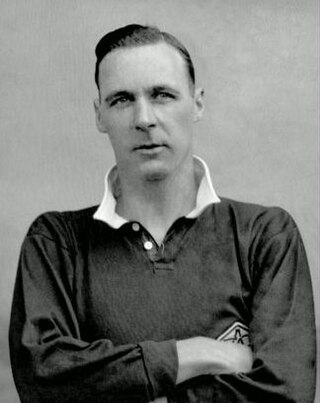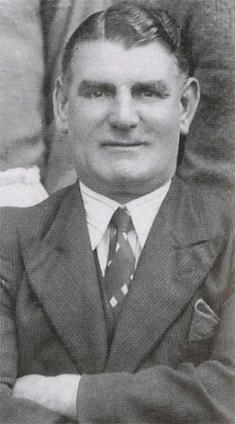Related Research Articles

Sheffield Wednesday Football Club is a professional association football club based in Sheffield, South Yorkshire, England. They compete in the EFL Championship, the second level of the English football league system.
Sunderland Albion Football Club was an English association football club based in Sunderland, England, formed in 1888. The club played in the Football Alliance, a rival to the Football League, before disbanding in 1892.

David Bone Nightingale Jack was an English footballer who played as an inside forward. He scored 267 goals from 490 appearances in the Football League playing for Plymouth Argyle, Bolton Wanderers and Arsenal. He was the first footballer to be transferred for a fee in excess of £10,000, was the first to score at Wembley – in the 1923 FA Cup Final – and was capped nine times for England. After retiring as a player, he managed Southend United, Middlesbrough and Shelbourne.
Birmingham St. George's F.C. was a football club based in Smethwick, England. The club started as St George's FC in Aston, before moving to the Cape Hill brewery in 1886 under the name Mitchell St George's.
Long Eaton Rangers Football Club was a football club based in Long Eaton, Derbyshire, England, which, for a brief period in the 1880s, had a legitimate claim to being one of the best teams in the country. They were founding members of the second ever league, The Combination, in 1888, and when that folded, the Football Alliance in 1889.
The following are events in the 1860s decade which are relevant to the development of association football. Included are events in closely related codes, such as the Sheffield Rules. All events happened in English football unless specified otherwise.
The 1889–90 season was the 19th season of competitive football in England. Preston North End were Football League champions for the second successive season while The Wednesday finished top of the newly formed Football Alliance. Blackburn Rovers won the FA Cup.

James Daniel Ross was a Scottish footballer who played as an inside forward.

Joseph Smith was an English professional football player and manager. He is eleventh on the list of England's top-flight goal scorers, scoring 243 league goals. He was manager of Blackpool for 23 years and guided them to victory in the 1953 FA Cup final, the only time they have won the competition since their 1887 inception.

The 1890 FA Cup final was contested by Blackburn Rovers and The Wednesday at the Kennington Oval.
Attercliffe Football Club was an English association football club based in Attercliffe, Sheffield, South Yorkshire.
David Weir was an English footballer who played for several clubs in the 19th century, including Bolton Wanderers and Ardwick, and won two caps for England.
Jim Cassidy was a Scottish footballer who played most of his career as a centre-forward for Bolton Wanderers in the late 19th century.
Francis McGinnes was a Scottish footballer. He was described as 'the best centre-forward that ever left Scotland'. A prolific goalscorer, he was Burslem Port Vale's best player. He died suddenly just before they started their first season in the Football League in 1892–93.
The 1891–92 season was the 11th season of competitive association football played by Small Heath Football Club, an English football club based in the Small Heath district of Birmingham, and their third season in the Football Alliance. At the end of the season, in which Small Heath finished in third position, most of the teams were absorbed into the newly formed Second Division of the Football League, and the Alliance folded for lack of membership.
James Massey was an English footballer who played as goalkeeper for Denaby United, Mexborough, Doncaster Rovers and The Wednesday at the turn of the 19th century.
The 1890–91 season was the tenth season of competitive association football played by Small Heath Football Club, an English football club based in the Small Heath district of Birmingham, and their second season in the Football Alliance. They finished in tenth position in the twelve-team league for the second consecutive year. Seven wins, two draws and thirteen defeats gave them sixteen points, one point fewer than in 1889–90. The team scored 58 goals in Alliance competition, but conceded 66, at an average of three goals per match.
The 1889–90 season was the ninth season of competitive association football played by Small Heath F.C., an English football club based in the Small Heath district of Birmingham. They competed in the inaugural season of the Football Alliance. They finished in tenth position in the twelve-team league with six wins, five draws and eleven defeats, which gave them seventeen points. The team scored 44 goals in Alliance competition but conceded 67.
Halliwell F.C. was an English association football club based in Halliwell, in north-west Bolton.
References
- ↑ "Played with Wednesday". Sheffield Independent: 8. 23 September 1937.
- ↑ "Between you, me and the Goalpost". Football Gazette (South Shields): 3. 2 October 1937.
- ↑ "Jim Smith". Wednesday Archive. Retrieved 26 April 2024. The 1893–94 season refers to a different footballer.
- ↑ "Wednesday v Notts County". Sheffield Independent: 7. 1 March 1890.
- ↑ "Bolton Wanderers v Sheffield Wednesday". Derby Daily Telegraph: 3. 10 March 1890.
- ↑ "The English Association Challenge Cup". Sheffield Independent: 7. 31 March 1890.
- ↑ "The Alliance". Manchester Courier: 7. 12 May 1890.
- ↑ "Football notes". Sheffield Independent: 7. 23 February 1892.
- ↑ "Local cricket chat". Star Green 'un: 4. 17 July 1909.
- ↑ "The "Blue Riband" of angling". Star Green 'un: 3. 17 September 1932.
- ↑ "Tiny tots' happy party". Sheffield Daily Telegraph: 7. 8 January 1931.
- ↑ "Played with Wednesday". Sheffield Independent: 8. 23 September 1937.